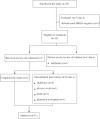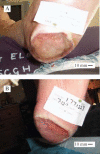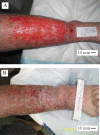Uncontrolled, open-label, pilot study of tea tree (Melaleuca alternifolia) oil solution in the decolonisation of methicillin-resistant Staphylococcus aureus positive wounds and its influence on wound healing
- PMID: 21564552
- PMCID: PMC7950497
- DOI: 10.1111/j.1742-481X.2011.00801.x
Uncontrolled, open-label, pilot study of tea tree (Melaleuca alternifolia) oil solution in the decolonisation of methicillin-resistant Staphylococcus aureus positive wounds and its influence on wound healing
Abstract
Many complementary and alternative products are used to treat wounds. The essential oil of Melaleuca alternifolia, tea tree oil, has proven antimicrobial and anti-inflammatory properties, may be useful in methicillin-resistant Staphylococcus aureus (MRSA) decolonisation regimens and is reputed to have 'wound-healing' properties, but more data are required to support these indications. The primary aim of this uncontrolled case series was to assess whether a tea tree oil solution used in a wound cleansing procedure could decolonise MRSA from acute and chronic wounds of mixed aetiology. The secondary aim was to determine if the tea tree oil solution influenced wound healing outcomes. Nineteen participants with wounds suspected of being colonised with MRSA were enrolled in a pilot study. Seven were subsequently shown not to have MRSA and were withdrawn from the study. As many as 11 of the remaining 12 participants were treated with a water-miscible tea tree oil (3·3%) solution applied as part of the wound cleansing regimen at each dressing change. Dressing changes were three times per week or daily as deemed necessary by the study nurse following assessment. One participant withdrew from the study before treatment. No participants were MRSA negative after treatment. After treatment had been implemented, 8 of the 11 treated wounds had begun to heal and reduced in size as measured by computer planimetry. Although this formulation and mode of delivery did not achieve the primary aim of the study, tea tree oil did not appear to inhibit healing and the majority of wounds reduced in size after treatment.
© 2011 The Authors. © 2011 Blackwell Publishing Ltd and Medicalhelplines.com Inc.
Figures




References
-
- Carson CF, Cookson BD, Farrelly HD, Riley TV. Susceptibility of methicillin‐resistant Staphylococcus aureus to the essential oil of Melaleuca alternifolia. J Antimicrob Chemother 1995;35:421–24. - PubMed
-
- Carson CF, Hammer KA, Riley TV. In‐vitro activity of the essential oil of Melaleuca alternifolia against Streptococcus spp. J Antimicrob Chemother 1996;37:1177–8. - PubMed
-
- Hammer KA, Carson CF, Riley TV. Susceptibility of transient and commensal skin flora to the essential oil of Melaleuca alternifolia (tea tree oil). Am J Infect Control 1996;24:186–9. - PubMed
-
- Nelson RRS. In‐vitro activities of five plant essential oils against methicillin‐resistant Staphylococcus aureus and vancomycin‐resistant Enterococcus faecium. J Antimicrob Chemother 1997;40:305–6. - PubMed
Publication types
MeSH terms
Substances
LinkOut - more resources
Full Text Sources
Other Literature Sources
Medical
Research Materials

